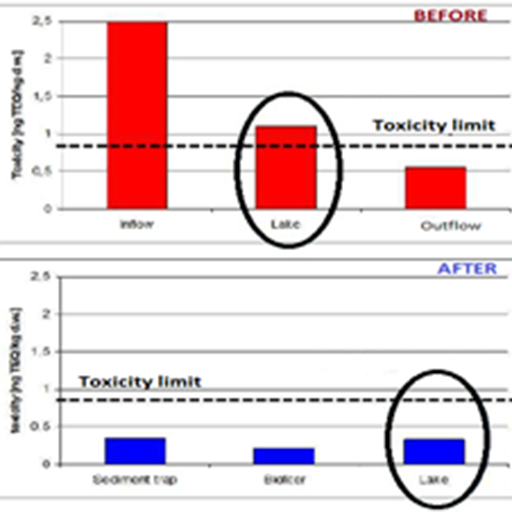ECOHYDROLOGY SYSTEMIC SOLUTION FOR RESTORATION OF THE BURKITU RESERVOIR AS AN ALTERNATIVE WATER SUPPLY SOURCE FOR THE ASELLA CITY POPULATION (ETHIOPIA)




Description
Location


Sketch

Information about lithology/geochemistry:
Volcanic, alkaline basalts and trachytes
Main Description
- Located in Oromia Regional State, inside the Ashebeka river basin in Ethiopia. The Asella town is situated 175 km south-east of Addis Ababa on a sloping plateau between Mt. Chilalo and the Rift Valley escarpment.
- The Asella Lake’s (or Burkitu Reservoir with earth fill dam gross capacity of 250,000 m3) usage has been abandoned since it caused disease among the people from its high rate of dioxin pollution (fig.1).
- This project is in cooperation with MoWIE (Ministry of Water, Irrigation and Energy of Ethiopia).
Enhance ecohydrological processes in novel ecosystem
NO
Apply complementary Ecohydrological processes in high impacted system
YES
This table presents the different categories of ecosystem services that ecosystem can provide, divided in:
Provisioning Services are ecosystem services that describe the material or energy outputs from ecosystems. They include food, water and other resources.

Food: Ecosystems provide the conditions for growing food. Food comes principally from managed agro-ecosystems but marine and freshwater systems or forests also provide food for human consumption. Wild foods from forests are often underestimated.

Fresh water: Ecosystems play a vital role in the global hydrological cycle, as they regulate the flow and purification of water. Vegetation and forests influence the quantity of water available locally.
Regulating Services are the services that ecosystems provide by acting as regulators eg. regulating the quality of air and soil or by providing flood and disease control.

Local climate and air quality: Trees provide shade whilst forests influence rainfall and water availability both locally and regionally. Trees or other plants also play an important role in regulating air quality by removing pollutants from the atmosphere.
Ecosystem services "that are necessary for the production of all other ecosystem services". These include services such as nutrient recycling, primary production and soil formation.
Cultural Services corresponds nonmaterial benefits people obtain from ecosystems through spiritual enrichment, cognitive development, reflection, recreation, and aesthetic experiences.

Recreation and mental and physical health: Walking and playing sports in green space is not only a good form of physical exercise but also lets people relax. The role that green space plays in maintaining mental and physical health is increasingly being recognized, despite difficulties of measurement.

Aesthetic appreciation and inspiration for culture, art and design: Language, knowledge and the natural environment have been intimately related throughout human history. Biodiversity, ecosystems and natural landscapes have been the source of inspiration for much of our art, culture and increasingly for science.
Lifezones

![]()
PPT(mm/yr): 140.0
![]()
T(ºc): 15.0
| Elevation of demosite: | 2300.0 meters above sea level |
| Humidity: | Arid |
| PETr (by year): | 6.3 |
EH Principles
Distribution of ecosystems and their relevant processes (ex: metabolism=water and nutrient uptake and retention; biomass production)
Ecological engineering (integration, dual regulation and biotechnologies in catchment scale for enhancement of ecological potential)
ECOHYDROLOGY ENGINEERING SOLUTIONS
Restitution of eroded soils through the application of biodegradable geofibers on the stream banks and phytoremediation.
 Phytotechnology
Phytotechnology
Construction of an infiltration dam called the Asella Sequentional Biofiltering System (ASBS) in 2010 to absorb micropollutants and nutrients and to convert them into less toxic forms.
 Ecohydrological Infrastructure
Ecohydrological Infrastructure
Major Issues
- Dioxin-induced toxicity in Asella Lake and inside the sediment
- High siltation of Asella Lake
- Land erosion due to agricultural activities




Expected Outcomes
Reduction of dioxin-induced toxicity in Asella BioFarm Park Lake (figs.1&2)
Latest Results
- After the sediment removal from the sedimentation chamber (ASBS), total phosphorus was reduced by 93%, total nitrogen by 73%, organic matter by 36% and mineral matter by 67% (Y. Z. Negussie et al, 2012).
Contacts
Yohannes Z. Negussie
- yhnnszerihun@gmail.com
- http://www.mowr.gov.et/
- Ministry of Water, Irrigation and Energy, Addis Ababa and European Regional Centre for Ecohydrology
- http://www.mowr.gov.et/

Social ecohydrological system
EH Objectives
EH Methodology
Catchment Ecohydrological sub-system
Objectives
Stakeholders
Catchment Sociological sub-system
Activities